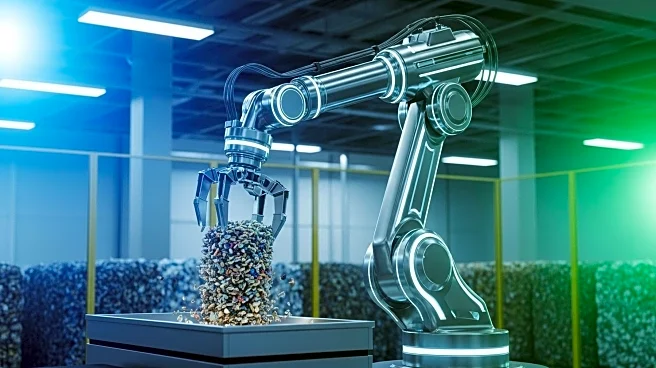What's Happening?
Artificial intelligence is revolutionizing the recycling industry, with several AI-powered technologies being recognized in Time Magazine's 2025 Top 100 Innovations list. These technologies, including those developed by AMP One, Glacier, and Greyparrot, are enhancing the efficiency of packaging waste identification and sorting. The innovations are transforming recycling practices at material recovery facilities (MRFs) and consumer packaged goods (CPGs) companies. By leveraging AI, these systems provide data-driven insights into packaging performance, helping brands understand how their packaging is perceived and processed by consumers. Companies like Amazon are collaborating with these AI-driven sortation pioneers to improve their packaging strategies and sustainability efforts.
Why It's Important?
The inclusion of AI-powered recycling technologies in Time's Top 100 Innovations list highlights the growing importance of sustainable practices in the packaging industry. As regulatory pressures increase, brands are being pushed to adopt more circular practices, such as using recycled materials and meeting minimum recycled content laws. These technologies offer concrete solutions to enhance sustainable packaging, potentially accelerating the shift towards circular packaging goals. By improving data collection and analysis, brands can better communicate the recyclability of their packaging to consumers, ultimately reducing waste and promoting environmental responsibility. The recognition by Time Magazine brings these technologies to a wider audience, encouraging further adoption and innovation in the sector.
What's Next?
As AI-powered recycling technologies gain national attention, more companies are likely to explore partnerships with these innovators to enhance their sustainability efforts. The increased visibility may lead to further investment in AI-driven solutions, fostering advancements in recycling technology. Brands will continue to analyze data from these systems to refine their packaging strategies and improve consumer communication regarding recyclability. Additionally, regulatory bodies may consider these technologies when developing future policies aimed at promoting sustainable packaging practices. The ongoing collaboration between tech companies and CPGs could drive significant progress towards achieving circular packaging goals.
Beyond the Headlines
The rise of AI-powered recycling technologies also raises ethical and legal considerations regarding data privacy and consumer transparency. As companies collect and analyze data on packaging performance, they must ensure that consumer information is handled responsibly and transparently. Furthermore, the shift towards AI-driven solutions may impact employment in traditional recycling roles, necessitating workforce adaptation and retraining. The long-term implications of these technologies could lead to a more sustainable and efficient recycling industry, but stakeholders must address potential challenges to ensure equitable and responsible implementation.










